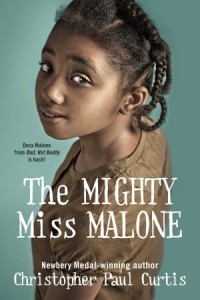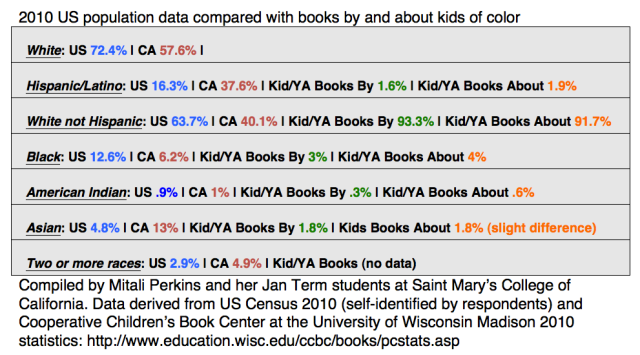The Mighty Miss Malone by Christopher Paul Curtis
Wendy Lamb Books, 2011 (Currently Available)
Genre: Historical Fiction
 Face Value: Just about perfect. Seriously, this is one of my favorite middle grade covers in ages. As Elizabeth Bird so aptly put it, “It’s not hiding the fact that the protagonist is black, nor is it ashamed of the fact that it takes place in the past. Even if Curtis were not the author of this book I’d be reading it first and foremost because I liked the cover so much.” And she’s exactly right. Deza jumps off the page, looking at us with just the right amount of spunk and skepticism. It gives us just the right amount of information, and aesthetically speaking, I’m proud to display it on my bookshelves.
Face Value: Just about perfect. Seriously, this is one of my favorite middle grade covers in ages. As Elizabeth Bird so aptly put it, “It’s not hiding the fact that the protagonist is black, nor is it ashamed of the fact that it takes place in the past. Even if Curtis were not the author of this book I’d be reading it first and foremost because I liked the cover so much.” And she’s exactly right. Deza jumps off the page, looking at us with just the right amount of spunk and skepticism. It gives us just the right amount of information, and aesthetically speaking, I’m proud to display it on my bookshelves.
Does it Break the Slate? Without a doubt, yes. Deza Malone, also known as The Mighty Miss Malone or Darling Daughter Deza (depending on who you’re talking to) is a serious Slatebreaker. She’s funny and thoughtful and deeply loyal to her family. She’s not going to let anyone mess with the people she loves, whether she’s up against a schoolyard bully or the Great Depression.
Who would we give it to? Well let’s not forget that this book is written by Christopher Paul Curtis, author of the extremely good, very popular and Newbery decorated The Watsons Go to Birmingham 1963 and Bud Not Buddy. Curtis is the kind of writer whose books are going to be read, and that’s a very good thing. Because Deza is such a likable, relatable character, and a serious reader, I’d be handing this one out to middle grade book lovers left and right.
Review: I can hardly tell you how excited I was for this book to come out. I have a lot of love for Christopher Paul Curtis, and I’ve found each one of his books to be moving, funny and personal. His characters have all made deep impressions on me over the years. So to find out that his new book features a female protagonist was about all I could ask for in a book. Brianna and I drove to our local bookstore the day it came out so that we could read it immediately. And luckily, and unsurprisingly, it was totally worth it. Deza Malone, who we encountered briefly in Bud, Not Buddy is a dynamite protagonist. As she explains in a school essay in the book’s first chapter,
“My most endearing trait, and being as modest as I am, I had to ask my brother Jimmie for this, is that I have the heart of a champion, am steady as a rock and can be counted on to do what is required. Jimmie also said I am the smartest kid he has ever met, but my all-encompassing and pervasive humility prevents me from putting that on this list…My dream is to read every book in the Gary Public Library and to be a teacher who is tough but fair.”
It turns out to be true. The Malone family is going through some hard times. With the onset of the Depression, nobody has enough money. Deza’s brother Jimmie hasn’t grown properly and Deza’s teeth are rotting with cavities since the family can’t afford dental care. After Mr. Malone is badly injured, their finances become desperate, and, once he recovers, he leaves Gary for Flint, Michigan to find work. But when Mrs. Malone loses her job, the family leaves to find him and ends up in a Hooverville outside of the city. Deza has to use all her strength to be there for her family.
As a personal side benefit, like the author, I grew up near Flint, MI. So a bonus for me to reading his books is that I get the thrilling feeling of recognizing my hometown when I’m reading. And this one was maybe the best one yet, because even though it’s set more than fifty years before I was born, Deza finds solace in the same Flint Public Library that was my favorite place in the world when I was growing up.

Deza is brilliant, but she’s also stubborn and extremely competitive, qualities that lend themselves to good and bad things. She wants to be the best student in school, the smartest, and works hard, but feels guilty for begrudging her best friend when Clarice gets a better score on an essay than Deza does. And when she physically attacks a bully who has been tormenting her brother, she doesn’t think twice about risking injury to stand up for the people she loves, but later worries:
“I was shaking now because I really, really liked what had just happened! I loved how I had raised my arm like I was carrying a magical sword and all the little thugs got quiet. They parted for me and Clarice like the Red Sea did for Moses! But most of all I loved knowing that when something was happening to someone I could do more than wring my hands, I could strike back!
I loved those feelings at the same time I hated them.
Fighting is wrong and very unladylike, but worse than that, by gut-punching the biggest bully at Lincoln Woods School I had humiliated Jimmie. And even though I’d stopped him from being hurt and maybe even murdered, I now saw a very scary side of myself.”
I love the complexity of this passage, and what it says about Deza’s character. I love that we see her, not simply as a fearless martyr (which would still be brave, but less interesting), but as a girl who is strong enough to protect herself and people she loves and is self-aware enough to understand that she likes the feeling of being strong. She also gets that she acts quickly and impulsively, and that the long-term repercussions might be bigger than the moment.
And as the book goes on, Deza has a lot more to contend with than fighting bullies. Being a young black girl in the 1930s, she’s forced to contend with a lot of people’s expectations of her, many of them unfair. Her teacher in Gary appreciated her enthusiasm and intelligence, but when she goes to school in Flint she’s disregarded and unchallenged. Her A+ essays get Cs, her teachers don’t call on her, and no one gives her tougher work when things are too easy for her. How can a girl who thrives on success be expected to do well in this environment?
Of course, books play a significant role, and are beautifully woven into this story – as Deza explains, “the less I cared at school, the more I read.” I love books about readers, and I love the way Deza talks about books. She makes it clear that next to her family, her relationship with reading is just about the most important thing in her life. But still, she struggles with the fact that she rarely gets to see a reflection of herself between the pages. She explains:
“I knew it was a great book when it felt like the author was writing about me. Some of the time I’d get snapped out of the book when I read things that I couldn’t pretend were about me, even if I had the imagination of Mr. William Shakespeare.
Words like ‘her pale, luminescent skin’ or ‘her flowing mane of golden hair’ or ‘her lovely, cornflower-blue eyes’ or ‘the maiden fair.’ I would stop and think, No, Deza, none of these books are about you.”
It’s absolutely thrilling to see Deza discover books by W.E.B. Dubois and Nella Larsen, but that doesn’t mean it’s ok that those books were so hard for her to find. And although things have gotten better since the 1930s, but we still have a long ways to go. Writer Mitali Perkins recently compiled some statistics about the number of books by and about kids of color, compared to the current US Population, available here.
 Looking at this, it becomes clear that we’re not, collectively, doing a good enough job in representing the full spectrum of our readers in the books that are out there. I was shocked, and seriously alarmed, to see that more than 90% of the books published for young people are by and about white people. However, we’re incredibly lucky to have writers like Curtis or Perkins, like Sharon Draper, Walter Dean Myers, Rita Williams Garcia, and so many others who are committed to writing stories that are actively changing the landscape of children’s literature. And the fact that The Mighty Miss Malone is now included in the scope of what’s available for young people to read, well – that in itself is a step in the right direction. But as a reviewer, and as an educator, Deza’s story is an important reminder to consciously represent a range of voices, both on this website and in the classrooms I work in.
Looking at this, it becomes clear that we’re not, collectively, doing a good enough job in representing the full spectrum of our readers in the books that are out there. I was shocked, and seriously alarmed, to see that more than 90% of the books published for young people are by and about white people. However, we’re incredibly lucky to have writers like Curtis or Perkins, like Sharon Draper, Walter Dean Myers, Rita Williams Garcia, and so many others who are committed to writing stories that are actively changing the landscape of children’s literature. And the fact that The Mighty Miss Malone is now included in the scope of what’s available for young people to read, well – that in itself is a step in the right direction. But as a reviewer, and as an educator, Deza’s story is an important reminder to consciously represent a range of voices, both on this website and in the classrooms I work in.
Reviewed from copy purchased at Changing Hands Bookstore.

AH! I want to read this book so much. Thanks for the review and for putting it on my radar.
Thanks! I think you will LOVE it. Curtis knows how to spin a story, that’s for sure. Can’t wait to hear what you think!
Pingback: On the Smugglers’ Radar | The Book Smugglers
Ah, I couldn’t figure out how this hadn’t gotten even a sprinkle of Newbery buzz, but apparently it’s a 2012 book, not 2011. Next year!
Yeah, you better believe it’s already on my list of 2012 Newbery predictions!
Pingback: Book Review: The Mighty Miss Malone by Christopher Paul Curtis | The Book Smugglers
Pingback: Review of the Day: The Mighty Miss Malone by Christopher Paul Curtis « A Fuse #8 Production
Pingback: Best of 2012: Our Favorite Middle Grade Titles | slatebreakers
this book is awesome our teacher red it to us as our read aloud it is the best !!!!!!!!